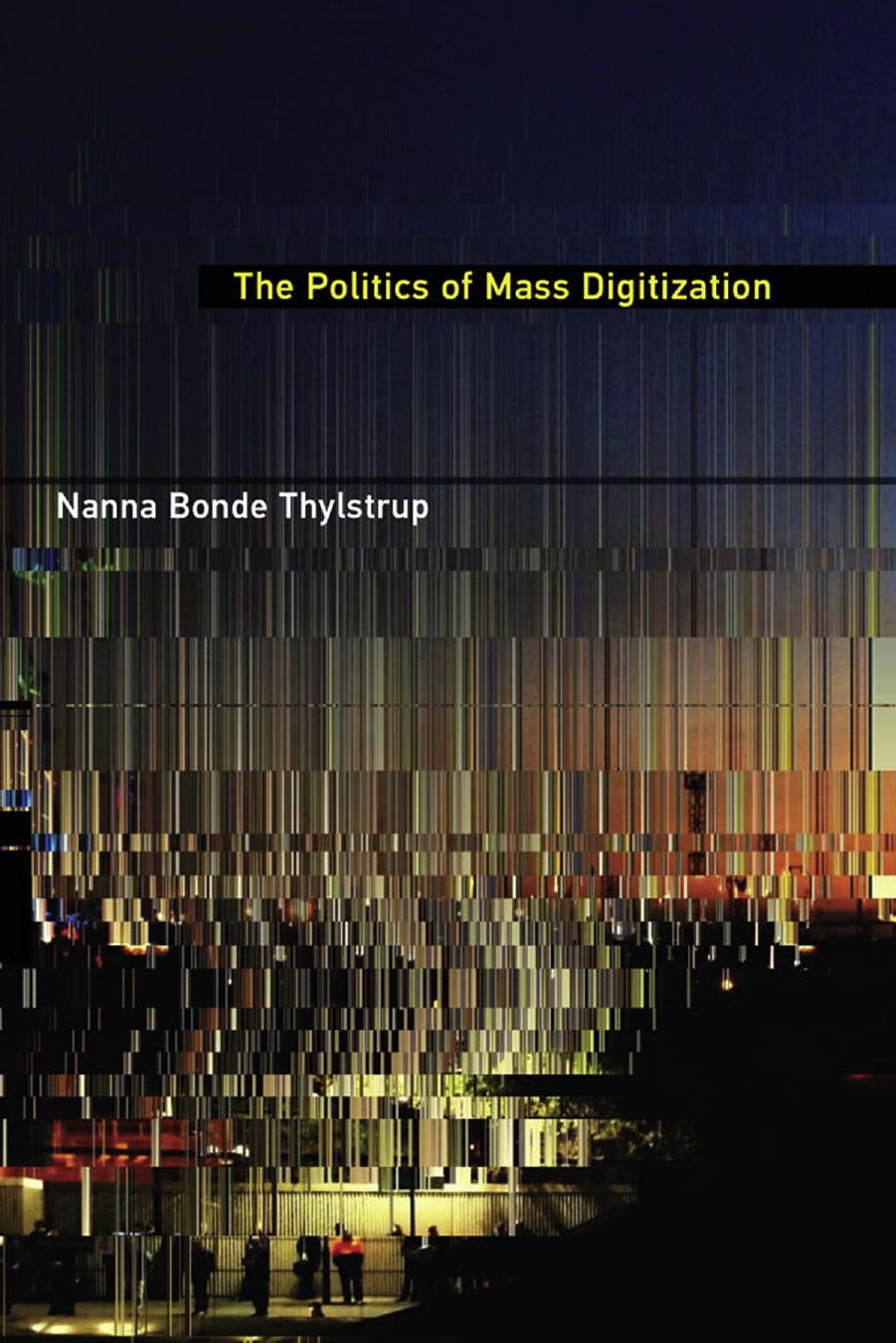Nanna Bonde Thylstrup: The Politics of Mass Digitization (2018)
Filed under book | Tags: · book, cultural memory, digitisation, europeana, google, infrapolitics, infrastructure, knowledge, library, media infrastructure, monoskop, networks, shadow library, speed, ubuweb

“A new examination of mass digitization as an emerging sociopolitical and sociotechnical phenomenon that alters the politics of cultural memory.
Today, all of us with internet connections can access millions of digitized cultural artifacts from the comfort of our desks. Institutions and individuals add thousands of new cultural works to the digital sphere every day, creating new central nexuses of knowledge. How does this affect us politically and culturally? In this book, Nanna Bonde Thylstrup approaches mass digitization as an emerging sociopolitical and sociotechnical phenomenon, offering a new understanding of a defining concept of our time.
Arguing that digitization has become a global cultural political project, Thylstrup draws on case studies of different forms of mass digitization—including Google Books, Europeana, and the shadow libraries Monoskop, lib.ru, and Ubuweb—to suggest a different approach to the study of digital cultural memory archives. She constructs a new theoretical framework for understanding mass digitization that focuses on notions of assemblage, infrastructure, and infrapolitics. Mass digitization does not consist merely of neutral technical processes, Thylstrup argues, but of distinct subpolitical processes that give rise to new kinds of archives and new ways of interacting with the artifacts they contain. With this book, she offers important and timely guidance on how mass digitization alters the politics of cultural memory to impact our relationship with the past and with one another.”
Publisher MIT Press, 2018
ISBN 9780262039017, 026203901X
ix+200 pages
Reviews: Paul Conway (Journal of the Association for Information Science and Technology, 2019), Logan Brown (New Media & Society, 2019), Marc Kosciejew (Information & Culture, 2019), Lizzie Martin (Convergence, 2019).
Commentary: Seb Chan (2019), Bill Caraher (2019).
Addie Wagenknecht, et al.: Deep Lab (2014)
Filed under book | Tags: · art, cyberfeminism, digital culture, feminism, internet, media infrastructure, privacy, security, surveillance, technology, web

“Deep Lab book is a compilation of reflections on digital culture, the post-Snowden Internet, and cyberfeminism. Created in five days by a dozen women, it represents the capstone to Deep Lab, a congress of cyberfeminist researchers, organized by Frank-Ratchye STUDIO Fellow Addie Wagenknecht to examine how the themes of privacy, security, surveillance, anonymity, and large-scale data aggregation are problematized in the arts, culture and society.
During the second week of December 2014, the Deep Lab participants—a group of internationally acclaimed new-media artists, information designers, data scientists, software engineers, hackers, writers, journalists and theoreticians—gathered to engage in critical assessments of contemporary digital culture. They worked collaboratively at the STUDIO in an accelerated pressure project, blending aspects of a booksprint, hackathon, dugnad, charrette, and a micro-conference. The outcomes of this effort include the visualizations, software, reflections and manifestos compiled in this book; an album of ten lecture presentations, the Deep Lab Lecture Series; and a documentary film featuring interviews with the Deep Lab participants.”
By Addie Wagenknecht, Allison Burtch, Claire L. Evans, Denise Caruso, Harlo Holmes, Ingrid Burrington, Jillian C. York, Jen Lowe, Kate Crawford, Lindsay Howard, Lorrie Faith Cranor & CUPS, Maddy Varner, Maral Pourkazemi, and Runa A. Sandvik.
Publisher Deep Lab and Frank-Ratchye STUDIO for Creative Inquiry at Carnegie Mellon University, Dec 2014
Creative Commons BY-NC-SA 4.0 License
ISBN 978-1-312-77551-0
234 pages
PDF, PDF (109 MB, updated on 2018-4-14)
Deep Lab Lectures Series (10 videos, Dec 2014)
Documentary (18 min)
Theory, Culture & Society 29(4-5): Topologies of Culture (2012)
Filed under journal | Tags: · cultural theory, culture, database, mapping, media infrastructure, social theory, technology, topology

“In social and cultural theory, topology has been used to articulate changes in structures and spaces of power. In this introduction, we argue that culture itself is becoming topological. In particular, this ‘becoming topological’ can be identified in the significance of a new order of spatio-temporal continuity for forms of economic, political and cultural life today. This ordering emerges, sometimes without explicit coordination, in practices of sorting, naming, numbering, comparing, listing, and calculating. We show that the effect of these practices is both to introduce new continuities into a discontinuous world by establishing equivalences or similitudes, and to make and mark discontinuities through repeated contrasts. In this multiplication of relations, topological change is established as being constant, normal and immanent, rather than being an exceptional form, which is externally produced; that is, forms of economic, political and cultural life are identified and made legible in terms of their capacities for continuous change. Outlining the contributions to this Special Issue, the introduction discusses the meaning of topological culture and provides an analytic framework through which to understand its implications.” (from the Abstract)
With contributions by Celia Lury, Luciana Parisi, and Tiziana Terranova, Peter Sloterdijk, Rob Shields, Sandro Mezzadra and Brett Neilson, Penelope Harvey, Mike Michael and Marsha Rosengarten, Evelyn Ruppert, Steven D. Brown, Luciana Parisi, Richard Rogers, Xin Wei Sha, Brian Rotman, Scott Lash, Noortje Marres, Matthew Fuller and Andrew Goffey, Julian Henriques.
Publisher Sage
ISSN 0263-2764
342 pages
PDF (6 MB, updated on 2016-12-12)
Comment (1)
